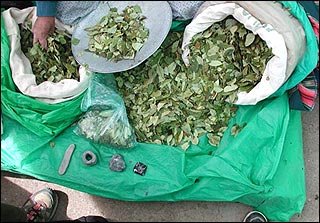Bolivia urges UN to defy Washington and legalise coca
Bolivia is leading a Latin American campaign to legalise coca plants despite them being vilified by the United States as the source of the world's cocaine industry.

Under the slogan "coca is not cocaine", politicians, consumers and growers across the Andes are promoting the leaf's qualities and calling for coca-based tea, yoghurt, bread, toothpaste, shampoo and soap to be mass produced and exported.
Its fans claim it helps digestion, provides more vital vitamins, nutrients and fibre than most vegetables and can even combat obesity.
But the plant has been listed by the United Nations as a poisonous species since 1961 because it also contains the alkaloid needed to make cocaine.
Bolivia has this week been arguing the case for legalising coca to the UN narcotics and crime agency in Vienna and hopes to change its status by 2008.
Indigenous communities have chewed its leaf here since 2,500 BC and brewed it as tea to boost their strength and stave off hunger and tiredness.
Even today, Bolivia's tin miners, who work in appalling work conditions, chew coca around the clock to stay awake and dull pain.
Prsident Evo Morales, a former grower who has campaigned for peasants' rights to tend the crop, has vowed to crack down on cocaine production in Bolivia, the world's third largest producer after Colombia and Peru.
But he insists the country should be allowed to grow more coca for natural, legal consumption.
And in neighbouring Peru a frontrunner in next month's election, Ollanta Humala, has suggested baking 27 million loaves of bread from coca leaves for school breakfasts daily.
Small companies in Bolivia, Peru and Colombia, have launched coca-based energy drinks, biscuits, breads and yoghurts, all faintly green in colour and supposedly providing invaluable nutritional benefits.
And although not officially for export, leaf-shaped coca biscuits are a popular buy at airport souvenir shops.
Some also claim that the leaf's ability to stunt appetite could provide a natural cure to the world's obesity epidemic.
Maria Eugenia Tenorio, Bolivia's best known coca cook, even claims to have lost more than two stone in eight months by eating large numbers of coca biscuits.
"If Bolivians just started cooking with coca, they could solve most of the problems of malnutrition here," she said in her La Paz kitchen, kneading green coca flour into mashed potatoes to make a local version of gnocchi.
The US spends up to $1 billion a year tackling drugs in the Andes.
The idea that more coca can be grown in Bolivia without boosting more cocaine production is "pie in the sky", US officials say.
By Sophie Arie

0 Comments:
Post a Comment
<< Home